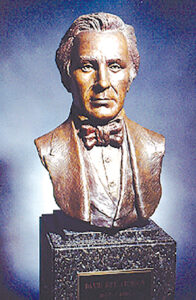 By Grover Brinkman
By Grover Brinkman We have lost civilizations, lost children and lost (underground) rivers, but a lost President? Bizarre thought!
Yet it seems that some unusual statistic at executive level surfaces in the headlines for a limited time, then is unceremoniously shoved under the rug. Perhaps senior citizens, jogging their memories, will remember, but only a minority. Let’s cite a few statistics, relative to things lost.
At one time Tower Rock, a large upthrust in the channel of the Mississippi river opposite the town of Grand Tower, Illinois, was headlined as “The Smallest National Park in America.” Today it is forgotten except by the riverboat men who try to avoid it as they pilot their boats.
Another image of “lost identity” is the short limelight tenure of David Rice Atchison, now an unremembered name. Yet he was President of these United States for the brief span of 24 hours. Or at least historians so persist.
When Joseph Robinette Biden, Jr. took the oath of office, he was listed as the 46th President of the nation. But wasn’t he actually the 47th? Writers and historians have turned out reams of copy regarding this question, and the debate still goes merrily on.
This particular case has been bothering researchers for a half century or more. Once a forgotten quirk in American history was unearthed, it changed the thinking of all writers who presumed all of our Presidents were accounted for in the archives of national history. Living or dead, each President had his niche in history. Or did they?
In 1908, an eastern daily newspaper exploded a bombshell with a statement that a Senator named David Rice Atchison had been President for the span of 24 hours, back in 1849. So, the editor contended, he was entitled to a place on the register of national chief executives.
How did it happen?
Seemingly the terms of James K. Polk and his Vice President, George M. Dallas, expired at noon on March 4. General Zachary Taylor, elected to the presidency the year before, was to be sworn in at that hour. But inauguration day fell on Sunday, and President-to-be Taylor, very religious, refused to take the oath until the following day.
So the office of U.S. President was vacant for one full day. The Vice President had also officially ended his term. So, abiding by the Succession Act of 1792, officially in effect, the Senate’s temporary head was next in line. So, historians say, David Rice Atchison became our 12th President, for a term of one day only.
The claim seemed irrefutable until a nationally known historian and scholar, G.H. Haynes, said “Not so!” Haynes claimed that Atchison’s term as Senator expired with the expiration of the 30th Congress on March 4. Although re-elected, his next term did not begin until noon of March 5. If Haynes’ theory is to be accepted, the nation was without a President for a full day. But other researchers argued. The issue has not been settled even today, a century and more ago.
With all of this argument, at least Atchison’s immortality is still secure. He gave his name to the city of Atchison, Kansas, and the county of Atchison in Missouri. A pioneer railroad, the Atchison, Topeka and Santa Fe also used his name.
Now to Tower Rock, in the Mississippi. Old records still on file say it is the smallest National Park in the nation. That came about in Civil War days, when the rock was supposed to support a bridge, built across the river here. But the bridge was never built, and today the National Park Service no longer recognizes the famous rock, site of many a river tragedy.
So David Rice Atchison and Tower Rock have one thing in common. Both made the headlines and then slipped into obscurity. Such is the tick of an impartial time-clock.















Follow Us